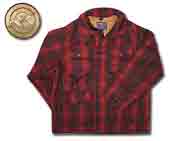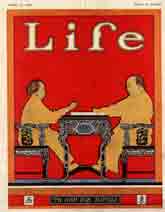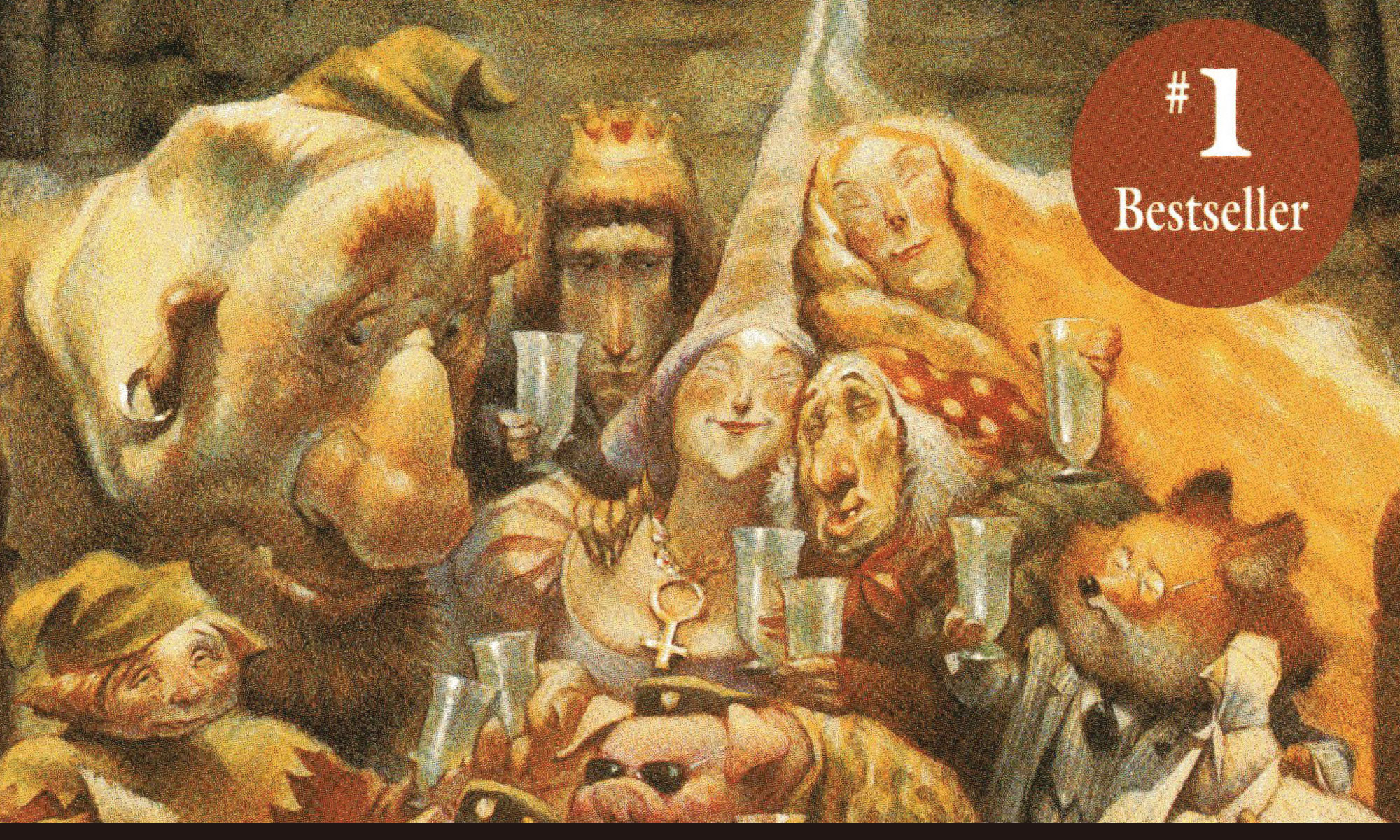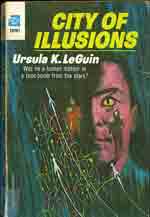Those beautiful, leggy, boring people who search for a Fountain of Youth by moving to warmer climes may have the right idea. The rest of us, realizing that our time on earth has been written down before we were born, have no problem living in the colder parts of the country. We see it as the natural order of things. Winter, along with Children, Disillusion, and The Crap They Call Music These Days, is what turns us old.
 I gave a jump-start to the aging process last winter, when I bought a new winter coat from the Woolrich catalog. I didn’t want some slick space-age number; I’ve had enough of those. I went for the classic red-and-black plaid hunter’s jacket. A “Pennsylvania Tuxedo” is what the catalog called it, and that’s how I describe it too. (An important question: Is this possibly the source for the name of Don Adams’ cartoon character, “Tennessee Tuxedo”?) Weighing in at 435 lbs., it’s a classic coat for deer hunters and crusty old coots of all kinds. Although I couldn’t kill anything that hasn’t already chewed through my siding and started eating my Lorna Doones, the coat does lend me that certain air, of kerosene, dried blood, Lucky Strikes, and domestic (as in, local county) whiskey. I was tempted to buy the pants that go with it, but frankly, with global warming, I don’t expect I’ll ever need to get that warm outside again.
I gave a jump-start to the aging process last winter, when I bought a new winter coat from the Woolrich catalog. I didn’t want some slick space-age number; I’ve had enough of those. I went for the classic red-and-black plaid hunter’s jacket. A “Pennsylvania Tuxedo” is what the catalog called it, and that’s how I describe it too. (An important question: Is this possibly the source for the name of Don Adams’ cartoon character, “Tennessee Tuxedo”?) Weighing in at 435 lbs., it’s a classic coat for deer hunters and crusty old coots of all kinds. Although I couldn’t kill anything that hasn’t already chewed through my siding and started eating my Lorna Doones, the coat does lend me that certain air, of kerosene, dried blood, Lucky Strikes, and domestic (as in, local county) whiskey. I was tempted to buy the pants that go with it, but frankly, with global warming, I don’t expect I’ll ever need to get that warm outside again.
The next step is choosing a hat. For warm ears, I haven’t bothered with anything but a watch cap for years now. Simple and unadorned. So simple, in fact, that they get grabbed, used, tossed around and lost like water bottles. Chicago has endured a lot of cold weather so far this year, and apparently we’ve had three times as much snow as last (still a pitiable amount, unfortunately). Thus the ear protection situation needed to be addressed with renewed vigor. Luckily, when my in-laws returned from a trip to Peru this fall, I added a cap woven from Andean alpaca wool. The kind that anthropology majors sport around college campuses, with bright geometric designs, drawstrings for the ear flaps, and some type of tall finger emerging from the very top. (Never been able to figure out what the finger is for. Maybe you can store jerky in it, or rescuers can use it to pull you out of snowdrifts.) I’ll wear it on occasion, but at times I think it appears that I’m trying to recapture lost youth, a time when pulling up stakes and climbing the mountains of South America seemed like a reasonable way to spend the winter months. (It was also a time when looking like an anachronism gave me a feeling of achievement, unlike now, when that feeling only comes when I turn down dessert.)
 So leave it to my wife, who has the enduring patience with online catalogs that I have with Monty Python sketches, to get us a couple of the perfect winter hats. Dark wool, sturdy top, long bill, ear flaps that tie down the front with authority. If you want to drop names, it’s a Stormy Kromer, although I’m instantly suspicious of crusty old characters mentioned in mail order stuff. I have a similar model that has earflaps tucked up inside. It may fit too loosely for a mountain railroad engineer like ol’ Stormy Kromer to rely on, but it’s warm, durable and irony-free.
So leave it to my wife, who has the enduring patience with online catalogs that I have with Monty Python sketches, to get us a couple of the perfect winter hats. Dark wool, sturdy top, long bill, ear flaps that tie down the front with authority. If you want to drop names, it’s a Stormy Kromer, although I’m instantly suspicious of crusty old characters mentioned in mail order stuff. I have a similar model that has earflaps tucked up inside. It may fit too loosely for a mountain railroad engineer like ol’ Stormy Kromer to rely on, but it’s warm, durable and irony-free.
My winter transformation from sardonic satirist to crusty old bastard is almost complete. What’s missing? A healthy dose of self-righteousness. Never fear: the weather itself provides that self-righteousness every time it snows. My neighbors to the north aren’t able to shovel their walks. One is an obese diabetic who has trouble walking around, and the next one is 85 and probably weighs 100 pounds (she’s living in the house her father built in 1916, which is pretty and kept up and will be torn down by condo developers in an eye-blink when she dies). I’ve shoveled their sidewalks for five or more years now, and don’t mind it a bit. I need the exercise, but most importantly, it’s “what you do.”
To the south of me is a three-flat, owned by twin brothers who are always on the hustle. Own a half-dozen rental properties on the North Side, in addition to their work in offices. They leave at six and come in at eleven. I never shovel their sidewalk, because in the 15 years I’ve lived here, they’ve never reached out to do a thing for me. The first couple winters, I shoveled their sidewalk, thinking they’d do mine when they had the chance, reciprocate, do the neighborly thing. But it never happened. On those snowy days when I didn’t get out their first, the extent of their clearing was one shovel’s-width from the front door to the street, with nothing done to the sidewalk. This happened even when the snow totaled half an inch. That’s a grand total of 45-seconds of work, versus the four minutes it would take them to clear their sidewalk. Not even any part of mine, just their own. The intention is clear, the rest of the world can go to hell, so I don’t do them any favors.
Their tenants might think we’re selfish, since we’ll shovel 125 feet of sidewalk to the north and not do an inch to the south. But they’re all 20 years younger than us, and I’ve never seen them do a lick to keep the place up. They’re a bunch of slackers anyway, with the social graces of a beaten dog. They don’t even say hi over the backyard fence, like we’re some FOB family with goats and a crazy violent grandma in the garage. I pass one of them walking the dog at least two mornings a week, and the grandest salutation I can elicit from him is a nod and a grimace.
So thank you, cold weather. And you too, snotty slacker neighbors. With your help, I have achieved my destiny in codgerhood many decades earlier than I would have in a milder climate. Uncertainty has been removed, allowing me to get on with other things, such as buying a yappy little dog, getting a pellet gun for the squirrels, and devising a clever retort for questions about how I’m doing that references illness and death.
 Here’s a snapshot that indicates where we are in the life of this household, in these times, in these here United States.
Here’s a snapshot that indicates where we are in the life of this household, in these times, in these here United States.

 Today Chicago’s temperature is in the single digits, the area was issued wind chill warnings overnight and today, and I’m loving it. We haven’t had a good, long, cold winter around here for 10 years or more, and it feels right. Of course, my only appointment outside today is a haircut, but I can bundle up any way I like for that. Take the hat off at the salon, hair looks like a mat of milkweed seeds, stylist tries to do something with it, pay and tip the stylist, put hat back on head, worry about how it looks sometime in April. Late April.
Today Chicago’s temperature is in the single digits, the area was issued wind chill warnings overnight and today, and I’m loving it. We haven’t had a good, long, cold winter around here for 10 years or more, and it feels right. Of course, my only appointment outside today is a haircut, but I can bundle up any way I like for that. Take the hat off at the salon, hair looks like a mat of milkweed seeds, stylist tries to do something with it, pay and tip the stylist, put hat back on head, worry about how it looks sometime in April. Late April. I gave a jump-start to the aging process last winter, when I bought a new winter coat from the
I gave a jump-start to the aging process last winter, when I bought a new winter coat from the  So leave it to my wife, who has the enduring patience with online catalogs that I have with Monty Python sketches, to get us a couple of the perfect winter hats. Dark wool, sturdy top, long bill, ear flaps that tie down the front with authority. If you want to drop names, it’s a
So leave it to my wife, who has the enduring patience with online catalogs that I have with Monty Python sketches, to get us a couple of the perfect winter hats. Dark wool, sturdy top, long bill, ear flaps that tie down the front with authority. If you want to drop names, it’s a  For the sake of family, we all do things during the holidays we’d rather not. One thing I did for the kids’ sake was go and see “Alvin and the Chipmunks”. They enjoyed the hell out of it, because basically there’s nothing funnier than little scurrying things making huge messes. It could have been a lot worse, and I mean that sincerely. That’s usually strong praise from me lately, as I exit the theater.
For the sake of family, we all do things during the holidays we’d rather not. One thing I did for the kids’ sake was go and see “Alvin and the Chipmunks”. They enjoyed the hell out of it, because basically there’s nothing funnier than little scurrying things making huge messes. It could have been a lot worse, and I mean that sincerely. That’s usually strong praise from me lately, as I exit the theater. Back home again after a little weekend away with my writing homies, the Hungerdungers. Middle of January, everything kind of slow at home and school—the perfect chance to retreat to my place in Michigan and indulge in the printed word. Five of us went up there on Friday, compared notes on fine scotches Friday night, ate some good Mexican food, woke up Saturday and…..
Back home again after a little weekend away with my writing homies, the Hungerdungers. Middle of January, everything kind of slow at home and school—the perfect chance to retreat to my place in Michigan and indulge in the printed word. Five of us went up there on Friday, compared notes on fine scotches Friday night, ate some good Mexican food, woke up Saturday and….. Last night’s Sugar Bowl left me torn between two extremes: Cheering for whoever plays against Ohio State (my usual position) and cheering for the Big Ten (very unpalatable when our representative is the Buckeyes). After watching the game into the third quarter, however, I decided the question was moot. There is no more mighty Big Ten to cheer for anymore, only a group of teams that tolerate cold weather and husky cheerleaders for the sure chance to head to a warm climate for a bowl game, where they invariably get mown down like a Dick Cheney quail.
Last night’s Sugar Bowl left me torn between two extremes: Cheering for whoever plays against Ohio State (my usual position) and cheering for the Big Ten (very unpalatable when our representative is the Buckeyes). After watching the game into the third quarter, however, I decided the question was moot. There is no more mighty Big Ten to cheer for anymore, only a group of teams that tolerate cold weather and husky cheerleaders for the sure chance to head to a warm climate for a bowl game, where they invariably get mown down like a Dick Cheney quail.